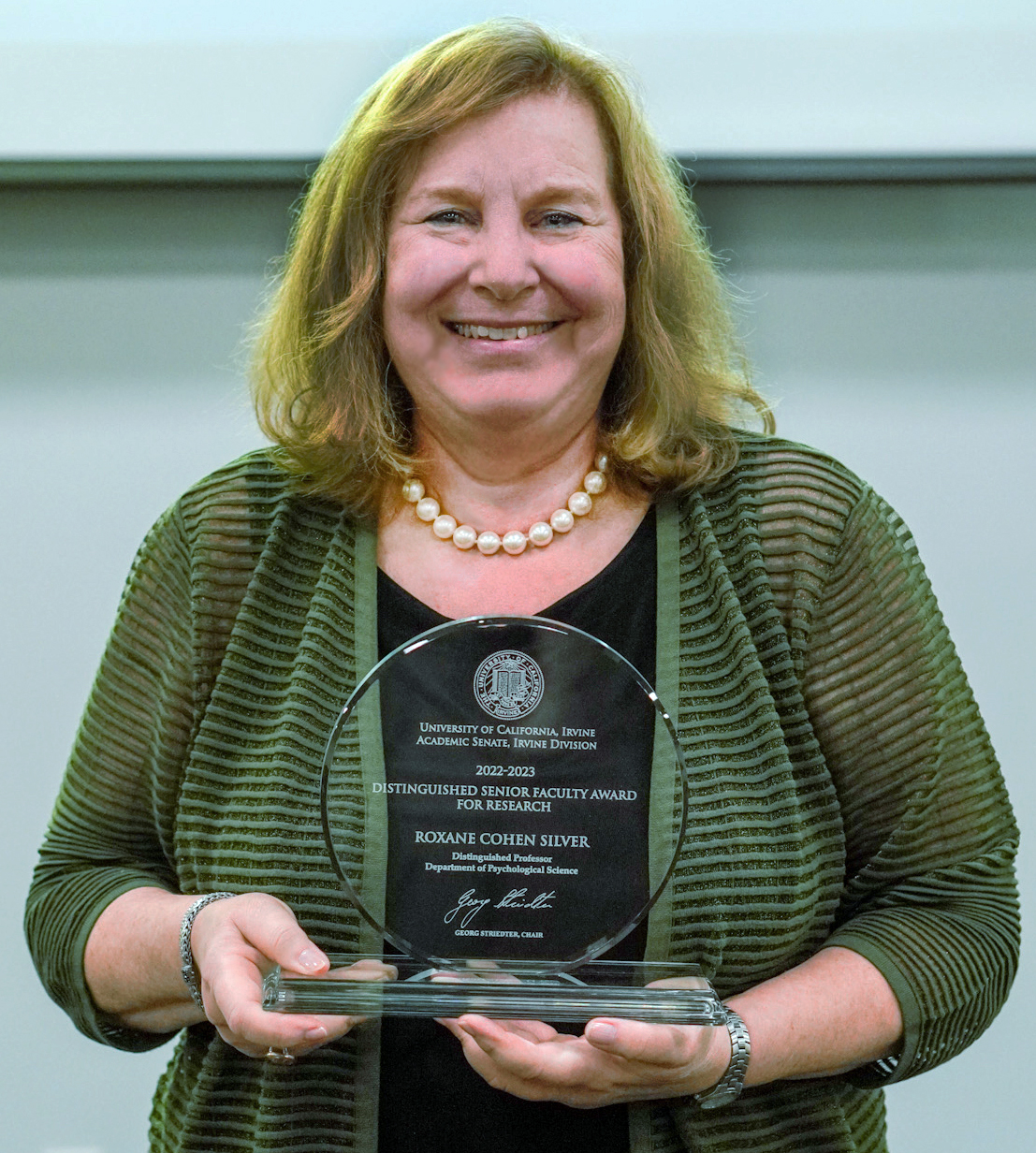
Roxane Cohen Silver, fourth from left, is congratulated by her colleagues at this year’s UCI Distinguished Faculty Awards Ceremony. Photos by Christine Parales Porciuncula
Roxane Cohen Silver delivers Distinguished Senior Faculty Award lecture
The final award of the night was the most prestigious a faculty member can receive from colleagues at UCI and it went to Roxane Cohen Silver, Distinguished Professor of psychological science, medicine, and public health and vice provost for academic planning and institutional research.
 As part of the 2022-2023 Distinguished Senior Faculty Award for Research, Silver had the honor of delivering a special lecture, “Coping with Collective Trauma: From Mass Violence to COVID-19.”
As part of the 2022-2023 Distinguished Senior Faculty Award for Research, Silver had the honor of delivering a special lecture, “Coping with Collective Trauma: From Mass Violence to COVID-19.”
But, first, she thanked the room full of fellow faculty members from across campus and her family who gathered at the Newkirk Alumni Center March 1 to fete her and nine other award winners.
“I was on the committee many years ago that selected these award winners and I know how competitive it is,” Silver said. “I’m so honored and I want to thank so many of my colleagues who are here tonight, and who nominated me for this award.”
UCI’s Academic Senate confers the award on a faculty member who has made significant contributions to scholarship through sustained, distinguished research.
Silver is an expert on coping with collective traumas. Since joining the faculty at UCI in 1989, her research has focused on community-wide disasters. She has studied trauma from natural disasters such as wildfires, earthquakes and hurricanes, mass violence events such as terrorist attacks and school shootings, and pandemics, including COVID-19. She has been offering her expertise to policymakers on Capitol Hill and in numerous journal articles, media interviews and webinars for decades.
Silver’s research has been funded by dozens of grants from the National Science Foundation, the National Institute of Justice, the U.S. Department of Homeland Security, and others. She regularly receives national honors and is cited by major media outlets as well as prestigious journals that publish her cutting-edge research.
In her Distinguished Faculty Lecture, Silver provided an overview of her research on the effect that media exposure has on how people cope with collective traumas like the Boston Marathon bombings, the Sept. 11 terrorist attacks, the Pulse Nightclub shooting in Orlando, Florida, and the Covid-19 pandemic.
In short, she has found the more media exposure, the more distress.
“Unlike direct exposure to an event that has a beginning and an end, media coverage of large collective traumas often includes eye-catching, sensationalized graphic and sometimes gruesome content that repeats over and over and over,” Silver explained.
In her studies, Silver and her research team have found that the more you engage in media related to terrorism and mass violence, the more likely you are to be distressed and the more you are drawn to the next news story about violence. And, she notes, “this is a cycle from which it is very difficult to extricate oneself.”
Because of her research results over the past couple decades, Silver said she and her colleagues were pretty sure that media might play a role in how people responded to the Covid-19 pandemic so they began a study at the very beginning of the pandemic in the United States. Beginning in March, 2020, they asked people about the extent to which they engaged in media about the pandemic and its associated stressors. As predicted, the researchers found that with increasing hours of daily media exposure, stress levels increased.
Silver offered the following takeaways:
- Both the amount and content of media-based exposure to collective traumas play an important role for health and well-being.
- Engaging in four or more hours per day of media about a collective trauma is associated with more psychological distress.
- Media exposure can create a feedback loop of distress and greater exposure to media over time.
- Overexposure to media about adversity can amplify stress in the short term, with likely downstream mental and physical health effects.
“My bottom line message is monitor your media exposure,” Silver advised. “There’s no shortage of bad news to capture our attention so it’s very important that we don’t get carried away.”
— Mimi Ko Cruz
Related
NSF supports research studying how Russia’s invasion of Ukraine affects Americans
What Matters to Roxane Cohen Silver
Expert of trauma psychology recognized